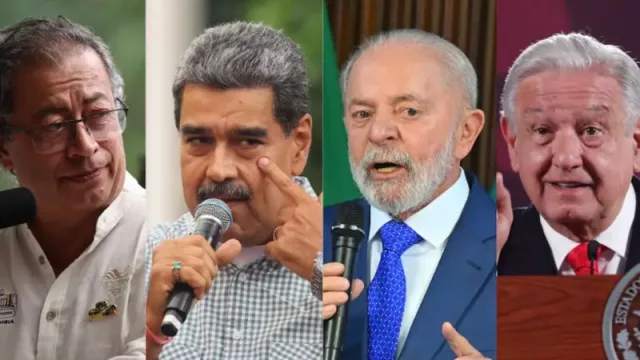The Importance of Free Will: Is It Just Politics, Debate, or the Essence of Our Coexistence Being Questioned Like Never Before?
Defending free will means recognizing that every individual has the right to make choices about their own life, free from the coercion of a state that assumes the role of protector. This principle is not only fundamental for personal development but also key to a dynamic, ever-evolving society. The diversity of thoughts, choices, and lifestyles enriches a community.
Thus, the defense of free will becomes a cultural battle that’s not just necessary but urgent—not for the sake of political life, but due to the drastic impact of inaction today on the advance of collectivism.
The Threat of Collectivism: Real or Exaggerated?
-
Collectivist movements, often cloaked in social benevolence, suggest that state dependence is the solution to societal problems. However, this dependence often translates into the erosion of individual autonomy.
-
“Contemporary” socialism, despite masquerading as modernity, repeats the mistakes of the past, denying and deepening them precisely by denying them.
-
This observation is crucial for understanding today’s politics. The main issue with the socialist idea is the denial of all its dogmatic errors.
Economically, there’s a lot to learn; today, China and Russia operate as state capitalisms (Communist-Statist). However, for the left to progress, it must acknowledge its foundational dogmatic errors. Statism and concentration, even if they yield partial success (the USSR was a leading power in Olympic sports, and China is on track to become the world’s top power), fail to recognize that their methodology entails a lack of freedom, resulting in not just pain but profound suffering and injustice for the sake of uniformity. In essence, totalitarianism (Statism) persists in varying degrees but remains fundamentally the same.
The Paradox of This Dispute: It Has Nothing to Do with Social Perspectives.
-
Nothing is more social than freedom—be it through free markets, civic engagement, or Statism (not the same as Statism).
-
The focus is the battle for manipulation and concentration of power, which is distorted by social struggle.
-
However, pragmatically, the issue remains when the state becomes the arbiter of our lives, limiting our choices and ultimately our freedom.
-
Even if it’s a good supplier for a time, it still has grave impacts on liberties, property, justice, and individual rights. It alters its purpose.
-
So, whether we lean more social or less, the consensus we should reach together as a society is that the foundational solutions lie in understanding freedom as the basis of those solutions.
Distortion: The Most Perverse Form of Manipulation for the Well-Intentioned to Contribute to Power Concentration.
We recommend watching the movie Equilibrium (here’s the trailer).
Twisting Truth: A Tool for Political Manipulation
Today, the distortion of facts and narratives has become a currency in the realm of political manipulation. This practice doesn’t just aim to twist reality for specific interests; it’s been weaponized by totalitarian regimes and populist movements to vilify those advocating for freedom and individual autonomy.
-
The paradox we face is that anyone who exposes regimes like Maduro as de facto totalitarian, demagogic, or fascist is branded a fascist themselves by the media and activists defending him.
Ideological fanaticism and confirmation bias attack those who mirror this bias and fanaticism. Recognizing this reality and confronting our cognitive blind spots—emotional, cultural, dogmatic, familial, traditional—helps us break free from our own confines.
“Militancy only creates limitations.”
-
In this context, it’s vital to understand how the victimization of minority or majority groups and the search for scapegoats are used to consolidate power and silence dissent.
Experts in Political Manipulation:
Globally, figures like Noam Chomsky and Slavoj Žižek are recognized for their critical analysis of media and political manipulation. Chomsky, for example, has highlighted how media can distort information to serve corporate and state interests, crafting narratives that favor social control.
-
On the flip side, Žižek explores how language and ideology shape public perception, turning the victimization of certain classes into a legitimizing tool for authoritarian policies.
Does Reality Surpass Fiction?
“To guarantee security and maintain stability, the Republic, immediately, becomes the First Galactic Empire, to preserve order and the safety of society.”
—Star Wars (The Chancellor).
Victimization and Distortion
When the victimization of minorities or majorities is used as a political strategy, it can create an atmosphere of fear and division.
-
Populists often create enemies, blaming specific groups for social and economic woes. This tactic not only distorts reality but also distracts from the structural issues affecting society as a whole.
By turning dissenting citizens into villains, authoritarian leaders present themselves as benefactors protecting society from chaos, perpetuating a cycle of control and dependency.
-
In creating a world where everyone is a victim because of a few, rather than a lack of individual responsibility, power consolidates within “benefactor” groups managing a concentration system.
Figures like Maduro, Castro, Hitler, Che Guevara, Franco, Mussolini, and Chavez are all fascists—there’s no right or left in that; the right is the opposite of power concentration in the state.
For the right and for a strong new movement that claims to be neither center, right, nor left, nor neutral, but active civism—the state’s primary role must be to ensure that neither it nor anyone else holds concentrated power that impedes the absolute respect for individual freedoms.
-
The management of collaborative resources among individuals, the state, and the monopoly on violence, for instance, are entrusted (hence a constitution or social contract and corresponding laws) to prevent anything from seizing the power of individuals.
-
The goal isn’t to concentrate and provide from a whole but to energize coordination through free will. The essence of state power is to guarantee the power of individual freedoms.
-
Thus, regardless of good intentions, anything that alters this principle, both historically and currently, is not globally free, moral, just, or sustainable—even in mixed systems like state capitalism.
-
Paradoxically, even against state capitalism (which is a mix), enforcing that principle of free market dynamics can create significant problems for society, even if it brings temporary productivity but with severe repercussions on freedom and justice.
Stay tuned for the second part of this note in this edition, where we’ll share documentaries, books, and talks on the importance of defending individual freedoms against collectivist-statism
Sign Up for Free: Register and receive our newsletter by simply leaving your email and name here. (https://infonegocios.miami/suscribite-al-newsletter)
IG: @infonegociosmiami
Infonegocios RED: 4.5 million Anglophone Latinos reading business news daily.
Contacts: [email protected] or [email protected]












Tu opinión enriquece este artículo: